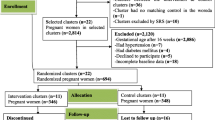Abstract
Objective
To assess the nutritional status and dietary practices among underprivileged pregnant women, identify the lacune, outline implement and assess the effect of nutritional counseling on their dietary intake, anthropometric status and anemia status.
Methods
Hundred pregnant women belonging to low socio-economic status were interviewed. Based on lacune, nutrition education (NE) was given in the form of simple messages to 50 subjects (NE-group) over 10–16 weeks period, while the remaining 50 formed the comparison group (Non-NE group). Tools used were individual counseling, weekly home visits and group meetings. Anthropometric measurements taken were height and weight. Dietary data was collected using 24-hour recall and food frequency questionnaire. Hemoglobin estimation was done. Effect of intervention was assessed by monitoring changes in dietary practices, weight gain, and nutritional status of the subjects.
Results
Baseline findings- low mean maternal body weight (51.05±7.26 kg), 96.3% anemia prevalence and severely suboptimal dietary intakes. Post-NE results revealed a significant increase in quality and quantity of the diets consumed. Mean hemoglobin levels significantly increased (Post-NEvs Non-NE=9.65±0.97vs 7.85±1.58, p<0.001) and anemia prevalence reduced (Post-NEvs Non-NE=78.7%vs 96%) in post-NE group.
Conclusion
Individual counseling with weekly reinforcement can bring about improvement in nutritional status during pregnancy.
Similar content being viewed by others
References
Gopalan C. Women and Nutrition in India.Ind J Nutr Dietet 1999; 36: 95.
Rabkins CS, Anderson HR, Bland JM. Maternal activity and birth weight: a prospective population based study.Am J Epidemiol 1990; 131(1): 522–531.
Widga AC, Lewis NM. Defined, in-home, prenatal nutrition intervention for low-income women.J Am Diet Assoc 1999; 99: 1058–1062.
Ramachandran P. Low-birth-weights: the Indian experience.NFI Bulletin 1993; 14(4): 5–8.
Thimayamma BVS, Rao P. Dietary Assessment as Part of Nutritional Status. In Bamji MS, Rao NP, Reddy V eds.Textbook of Human Nutrition. New Delhi, Oxford and IBH Publishing Co. Pvt. Ltd., 2003; 129–140.
International Nutritional Anemia Consultative Group (INACG).Measurement of Iron Status. Washington, D.C.: The International Nutritional Anemia Consultative Group; 1985.
Gopalan C, Sastri BVR, Balasubramanian SC.Nutritive value of Indian Foods. Hyderabad: National Institute of Nutrition; 1990.
Magbitang JA. Weight for height as a measure of nutritional status in Filipino pregnant women.Asia Pacific J Public Health. 1988; 2(2): 96–104.
Indian Council of Medical Research (ICMR).Dietary Guidelines for Indian—A Manual. Hyderabad: National Institute of Nutrition; 1998.
Kashyap S. Maternal work and nutrition profile of the pregnant and nursing mothers and their offspring among the quarry workers in Delhi-a prospective study.Unpublished Doctorate Dissertation. Department of Foods and Nutrition, Lady Irwin College: University of Delhi; 1993.
National Nutrition Monitoring Bureau (NNMB): Report of second repeat surveys (1996–97). Hyderabad: National Institute of Nutrition. ICMR; 1999.
Rao S, Yajnik CS, Kanade A, Fall CHDet al. Intake of micronutrient- rich foods in rural Indian mothers and size of their babies at birth. The Pune Maternal Nutrition Study.J Nutr. 2001; 131: 1217–1224.
Pallavi, Kharade P, Antony U. Nutritional status and outcome of pregnancy in young and older mothers in Mumbai.Ind J Nutr Dietet 2002; 39: 26–30.
National Family Health Survey-2 (NFHS-2).Uttar Pradesh. Mumbai, International Institute of Population Science; 1998–99.
Gulati V. Nutritional status as a determinant of pregnancy outcome among low socio-economic women belonging to two different communities.Unpublished Master’s Dissertation. Department of Foods and Nutrition, Lady Irwin College: University of Delhi; 1999.
Vijayalakshmi P, Mercy P. Birth weight in relation to the iron status of the pregnant women.Ind J Nutr Dietet 1994; 31: 1–7.
Kafatos AG, Vlachonikolis TG, Codrington CA. Nutrition during pregnancy: the effects of an educational program in Greece.Am J Clin Nutr 1989; 50: 970–979.
Gopalan C. Changing nutrition scene in South Asia.NFI Bulletin 2003; 24(2): 1–8.
Agarwal KN, Agarwal DK, Mishra KP. Impact of anemia prophylaxis in pregnancy on maternal hemoglobin, serum ferritin and birth weight.Ind J Med Res 1991; 94: 277–280.
Paul M and Vijayalakshmi P. Effect of improving the maternal nutritional status with reference to zinc, vitamin A and iron on the birth weight of the newborn.Ind J Nutr Dietet 2002; 39: 95–102.
Author information
Authors and Affiliations
Rights and permissions
About this article
Cite this article
Garg, A., Kashyap, S. Effect of counseling on nutritional status during pregnancy. Indian J Pediatr 73, 687–692 (2006). https://doi.org/10.1007/BF02898446
Issue Date:
DOI: https://doi.org/10.1007/BF02898446




